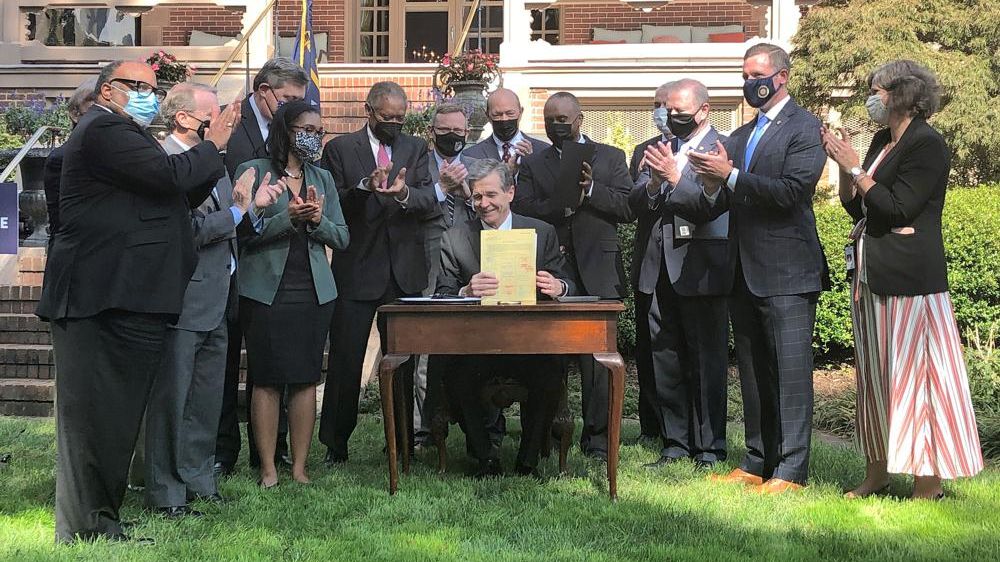RALEIGH. N.C. (AP) — Duke Energy Corp.’s electricity-generating subsidiaries for North Carolina told regulators on Monday how they can comply with a new state law demanding significant greenhouse gas reductions by the end of the decade.
The document filings with the North Carolina Utilities Commission come seven months after Democratic Gov. Roy Cooper signed bipartisan legislation that directed the utility to lower carbon dioxide emissions 70% from 2005 levels by 2030. Zero-net CO2 emissions would be met by 2050.
The law says the commission, which must rule on an energy path by year’s end, can delay the target years in some circumstances, and three of the four energy-portfolio alterations offered by Charlotte-based Duke Energy extend the date to 2032 or 2034.
Those three portfolios would rely less on solar power and energy-storing batteries and more on nuclear power and offshore wind turbines for emissionless production. They also would result in slightly lower average annual increases on retail power bills for the 4.4 million North Carolina and South Carolina customers through 2035 compared to reaching the 70% reduction in 2030, according to Duke Energy.
Company officials cautioned that the potential annual customer bill increases, ranging from 1.9% to 2.7%, could change and likely would be zero or minimal in the first few years of any plan that regulators approve. Some businesses and advocates for the poor opposed the final legislation because they believed the cost to ratepayers would be much more, or that the law lacked enough monetary assistance for low-income residents.
The portfolio options address energy production shifts by Duke Energy Carolinas and Duke Energy Progress, which have power plants and serve customers in both states. But the 70% reduction only applies to North Carolina because the law requires it. The utilities will file the plan in 2023 with the Public Service Commission of South Carolina as part of future planning there.
“Customers in North Carolina and South Carolina deserve an orderly energy transition that supports communities and maintains affordable rates, while ensuring the continued reliable service and economic competitiveness on which both states depend,” Duke Energy North Carolina President Stephen De May said in a news release.
The four portfolios envision retiring Duke Energy’s coal-fired power plants located in North Carolina by 2035, in keeping with a companywide announcement in February. The utility has already retired its coal-fired plants in South Carolina. Some that remain in North Carolina serve South Carolina customers.
All of the options rely on an “all of the above” mix to make up for the lost coal-fired power production and address future electricity need. They include grid improvements and energy efficiency; more solar power and battery storage; hydroelectric power storage; an emerging form of small nuclear power plants; and additional natural gas-powered plants, which provide energy on cloudy or high-demand days.
The portfolio that reaches a 70% reduction by 2032 relies more on offshore wind production. Of the two portfolios that reach the reduction by 2034, one emphasizes the use of “small modular reactors,” while the other would rely on nuclear and offshore wind. Additional nuclear likely wouldn’t come online until the early 2030s.
The North Carolina law says the commission can examine “the latest technological breakthroughs to achieve the least cost path,” among other considerations in signing off on a plan. The panel, composed of seven members nominated by Cooper, has the discretion to delay the 2030 target by up to two years, and even longer if regulatory and construction delays for nuclear or wind energy facilities arise, or if the grid’s performance is questioned.
Duke Energy said over 500 people representing more than 300 groups in the two states offered their input and feedback as the options were drafted. The commission will hold public hearings in July and August.
A coalition of environmental and clean energy groups said Monday that it will offer an alternative plan by July 15 that will also focus on equity and environmental justice.
“We may not agree on all the details included in the modeling to reach these goals but are optimistic that this process will lead to a cleaner electricity sector and more jobs across the state,” said Peter Ledford with the NC Sustainable Energy Association, a coalition member.
The law was considered a major regulatory and political accomplishment when enacted in October following negotiations largely between Cooper and state senators from both parties.
Duke is the dominant electric utility in North Carolina, while the two subsidiaries serve roughly a third of South Carolina electricity customers.



